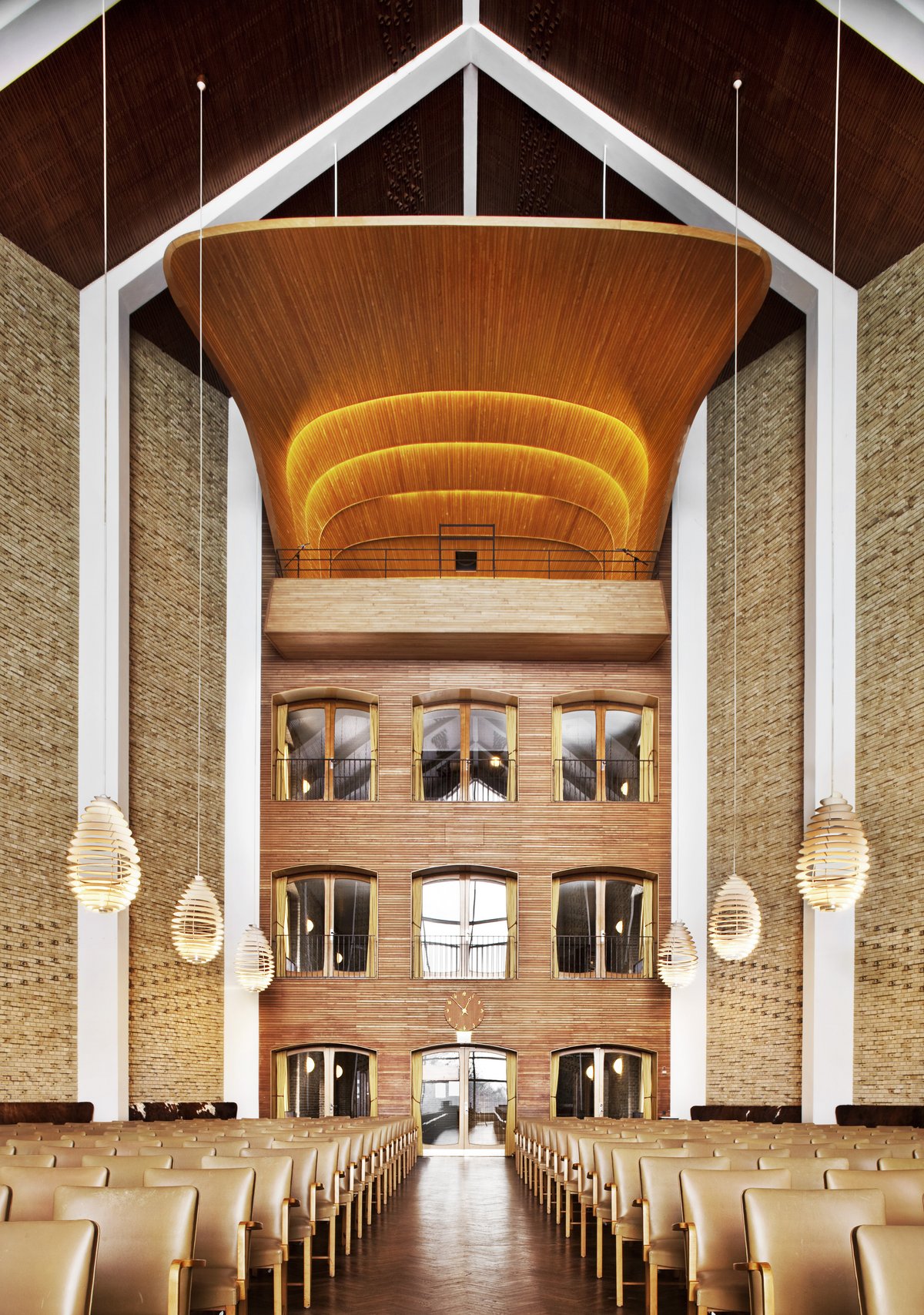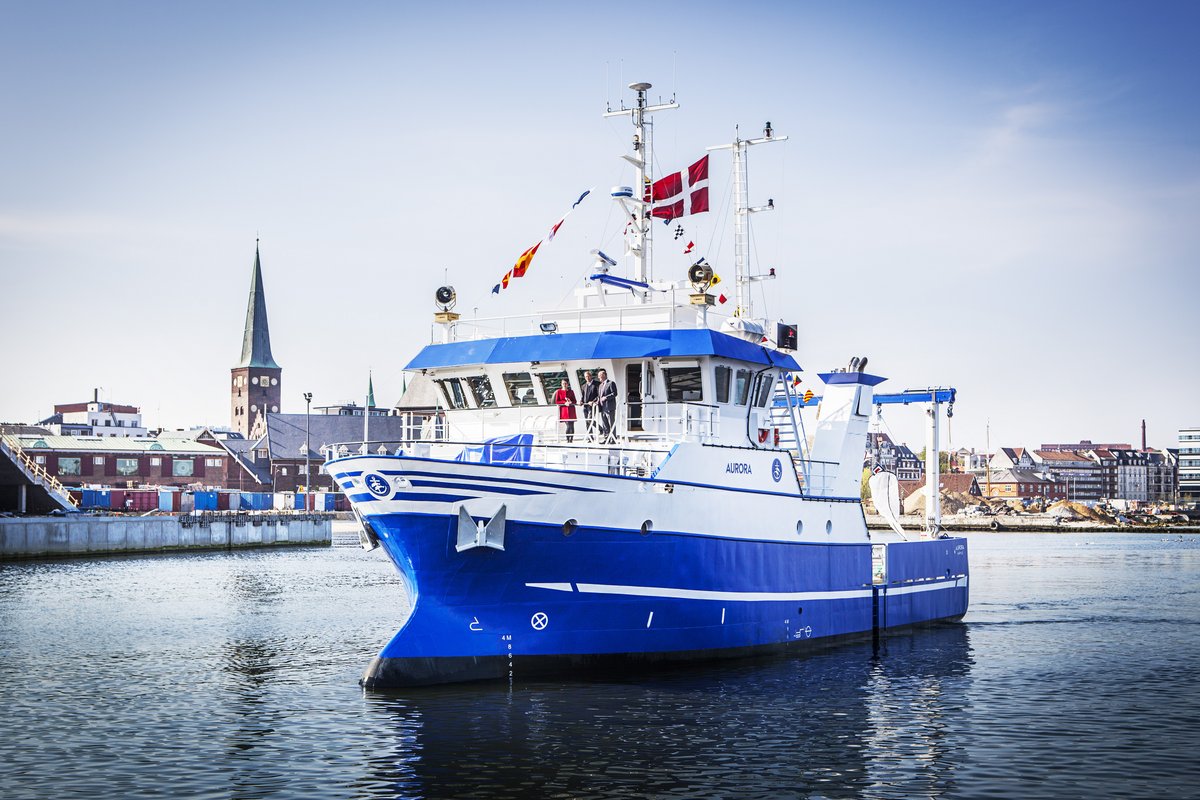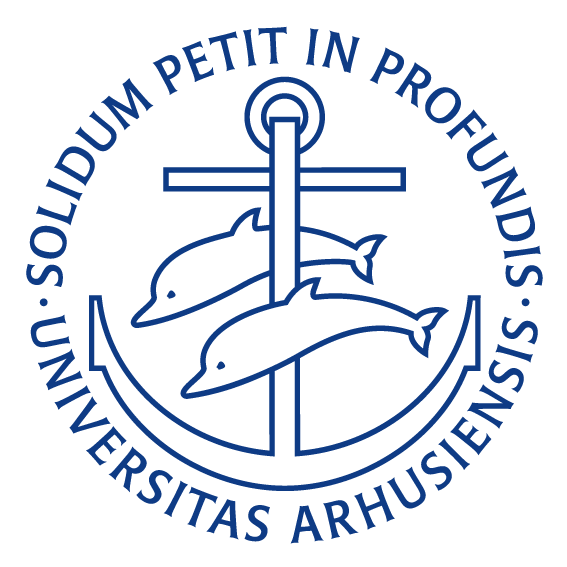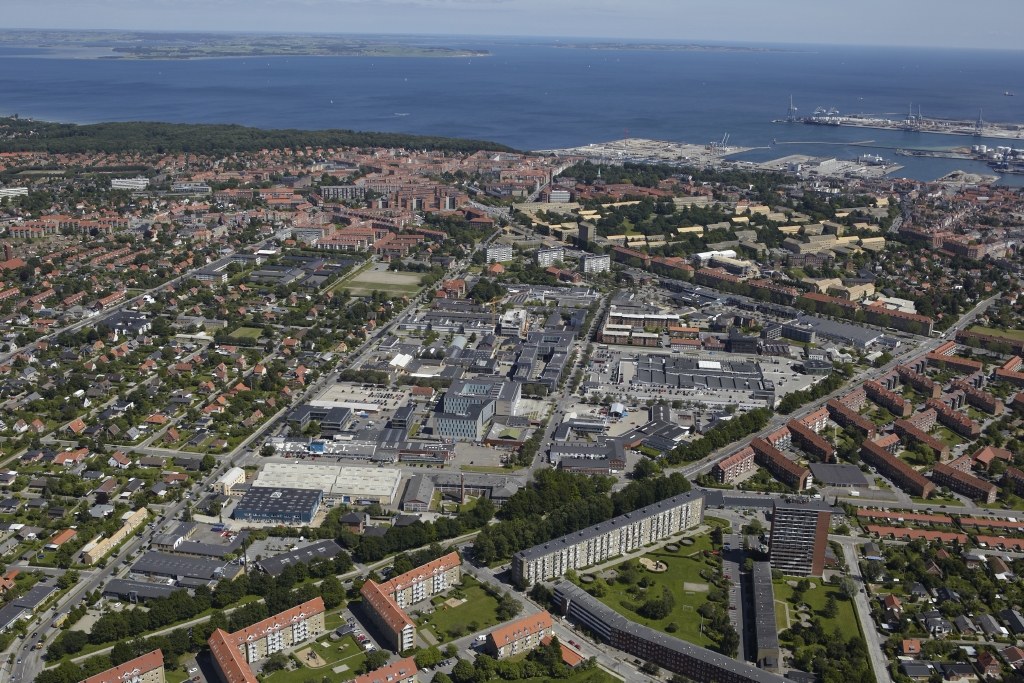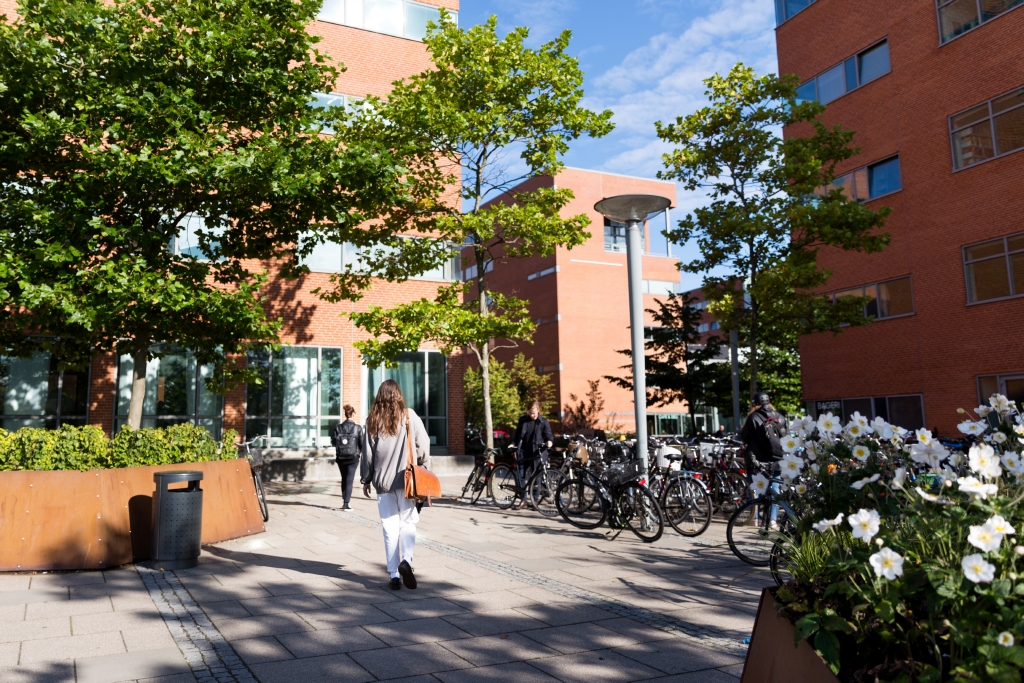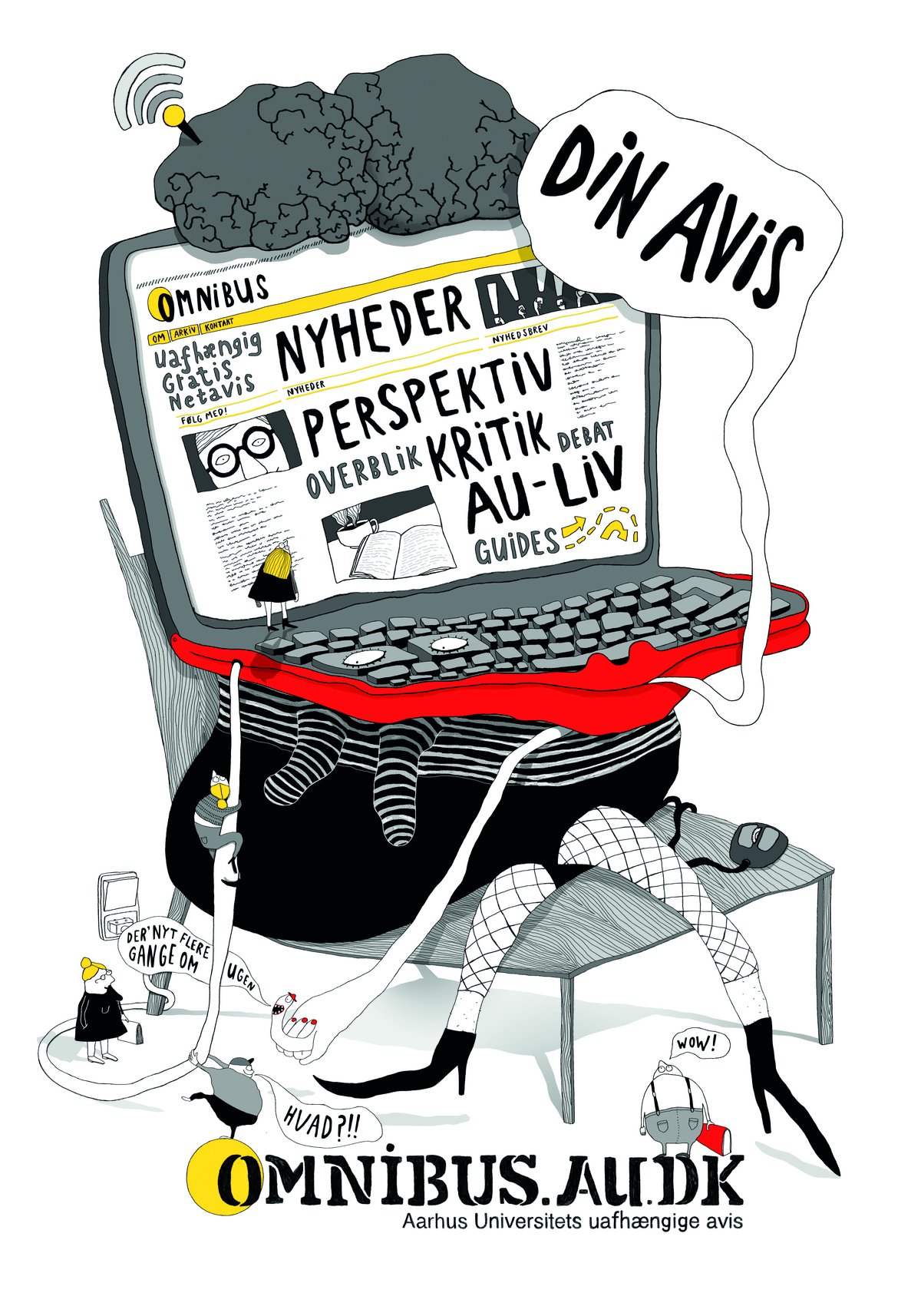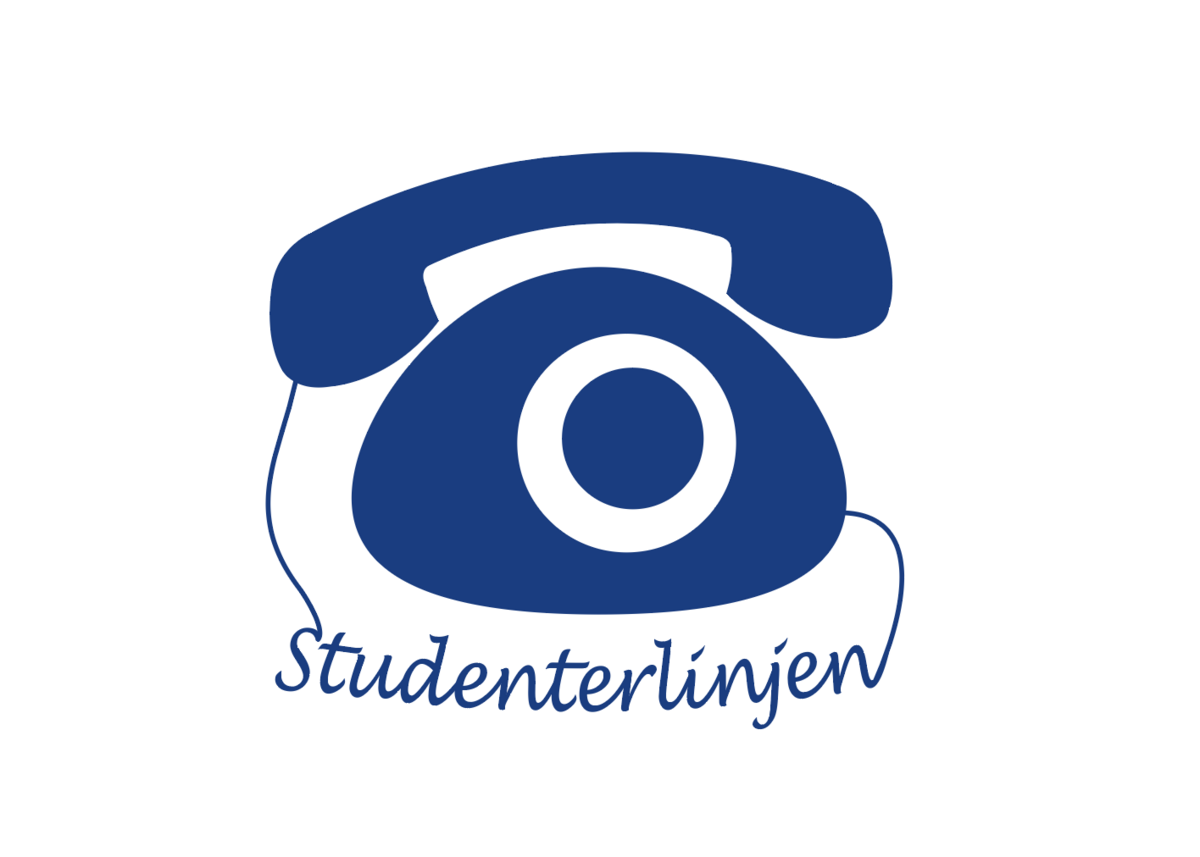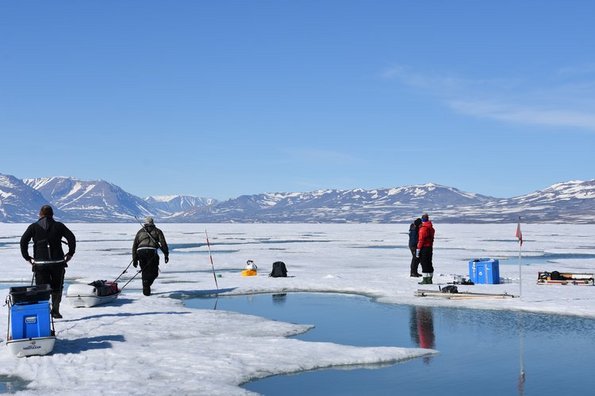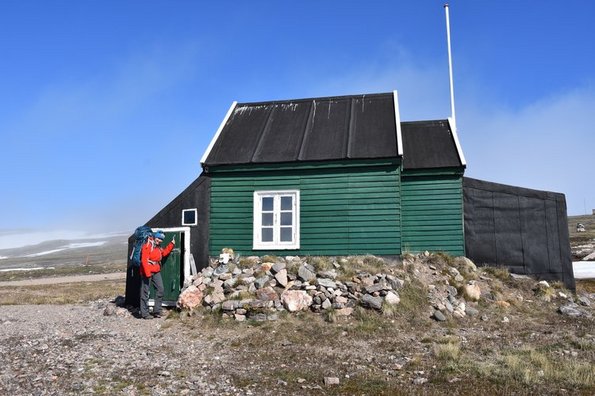AU Encyclopedia: Aarhus University from A to Z
If you’ve come to study at AU from abroad, in addition to getting used to the climate, the food and biking up and down all those hills, you also need to learn the lingo you need to survive and thrive as a student here. What are academic regulations? What’s a Friday bar? And is an AU VIP some kind of celebrity? Hint: no... Or well, it depends on the ego of the VIP you ask...
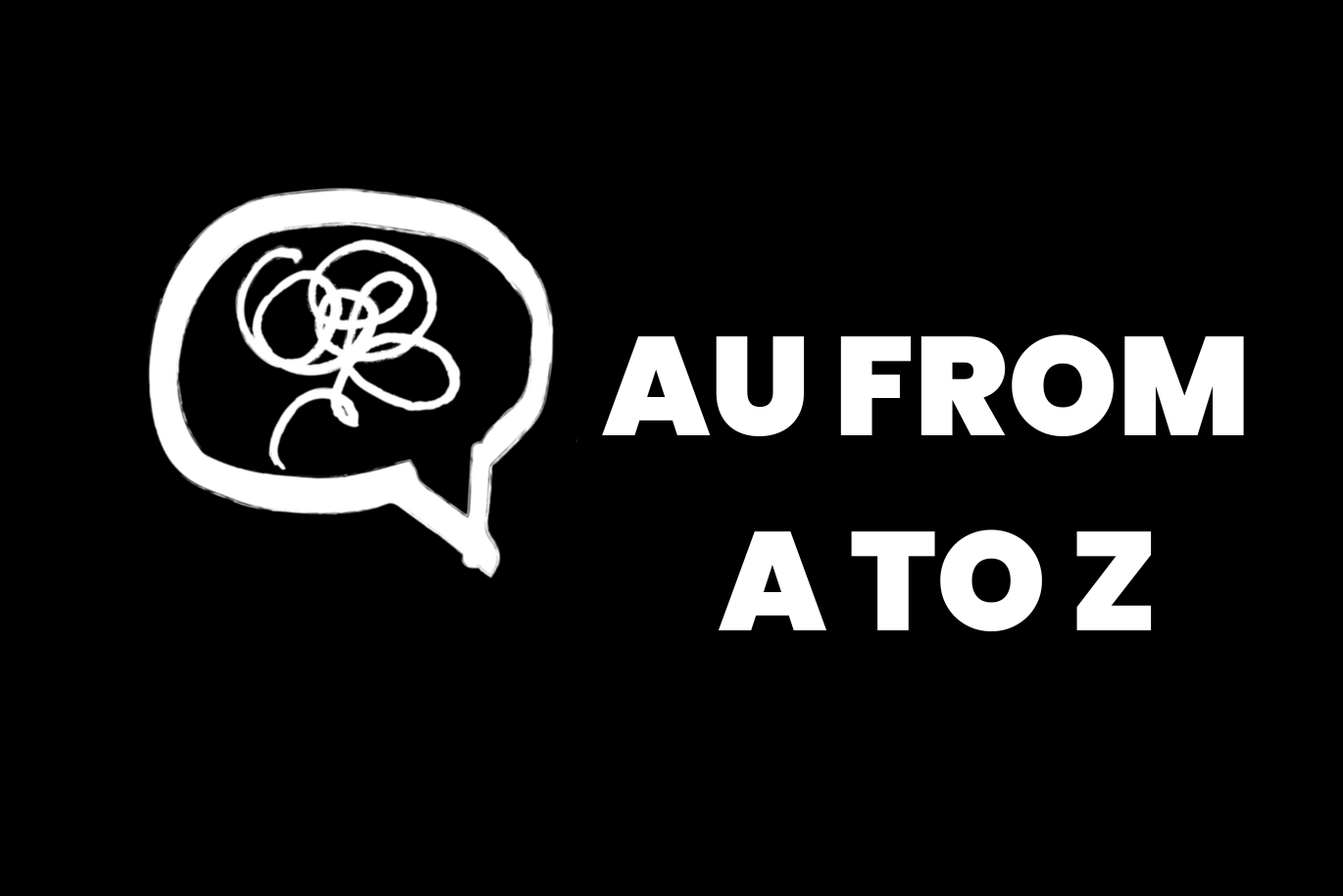
This article was first published in September 2022, but has been updated in 2025.
A
Aarhus BSS: The School of Business and Social Sciences, Aarhus University. One of the five faculties at AU, which is often just referred to as BSS. Here you will find the Department of Business Development and Technology, the Department of Law, the Department of Psychology and Behavioural Sciences, the Department of Political Science, the Department of Management, and the Department of Economics and Business Economics. In other words, if you study at BSS, you’re on the path to money and power.
Aarhus history: The university began in Aarhus. But now it can be found in several locations around the country. The university has campuses in Aarhus, Herning and Emdrup (Copenhagen) – and a new campus on the way in Viborg. It also has departments in Roskilde, Flakkebjerg (Slagelse) and Foulum (near Viborg).
Aarhus Ø: Literally means ‘Aarhus Island’ and refers to Aarhus Docklands. This area of the city is not only an artificial island but is also located on the far eastern point of Aarhus (east is denoted by the letter Ø in Danish). Smart, don’t you think?
Aarhus: Århus or Aarhus? At AU it is Aarhus...
Academia: The highfalutin’ word for the world of higher education and research. Work this word into your conversation often if you want to give the impression that you’re already thinking about the topic of your dissertation.
Academic quarter: Virtually all classes at AU start 15 minutes past the hour. So if your class is scheduled for 10 am, your lecturer won’t start actually open her mouth until 10:15. But this isn’t a license to show up late; you’re generally expected to be in your seat ready to learn when class actually starts. Once you’ve gotten used to the academic quarter, though, it’s a hard habit to drop.
Academic regulations: An esoteric term you’ll hear from your lecturers again and again. For good reason – so pay attention now. The academic regulations are the rules governing the structure and content of your degree programme: what classes you need to take, the order in which you need to take them, and the kind of exams you will have to take.
Alma mater: Another fancy term you can use after you graduate. It means ‘dear mother’ in Latin, and is a term of endearment alums use for their university.
Alumni: More Latin. A ten-dollar word that means ‘former students’. After you emerge from your studies clutching your diploma, you’ll be able to call yourself an AU alumnus (or alumna, if you’re a woman, or alum if you want a gender-neutral alternative). Now, isn’t that something! At AU, the students living in the residence halls are also referred to as alums.
Annual celebration: Since 1928, Aarhus University has celebrated the anniversary of its founding at the annual celebration. On this occasion, the university confers honorary doctorates and presents the distinguished alum for the year. The annual celebration is for important friends of the university and staff, and takes place in the Main Hall (Aulaen) and Concert Hall Aarhus. The students celebrate the day in a less formal way with Denmark's largest Friday bar and the sports day in the University Park.
Arts: One of the five faculties at AU. Arts is the humanities faculty. It’s comprised of three schools: the Danish School of Education (DPU), the School of Communication and Culture and the School of Culture and Society. In other words, it’s the faculty where you have to invent your own job when you graduate.
Assistant professor: A member of academic staff who is employed in a fixed-term position (a assistant professorship), typically immediately after earning a PhD degree, but before associate professor level. A assistant professor does research and teaches.
Associate professor: A associate professor is a permanent employee at the university in a associate professorship who teaches and conducts research.
AU Find: Where’s building 1481? How do I get to the library? The AU Find app is your new best friend when you can’t find the building where your class is being held 30 seconds before it’s scheduled to start (You may have more time than you think - see academic quarter). You’ll still have to find the classroom, though. Good luck navigating the endless corridors! But at least text your study group to let them know you’re on the way. Pro tip: All the room numbers on the ground floor are in the 100’s. The second floor is the 200’s and so on.
Have we left anything out?
Are there any terms or abbreviations you’d like us to include in the encyclopedia?
Write to us at omnibus@au.dk
How to look up a term
Are you looking for a specific word or concept? Use the CTRL + F shortcut.
AU Garden: AU has a garden, and no, it’s not the University Park. AU Garden is across from Nobel Park on Trøjborgvej. It’s a secret green oasis tended by staff and students – there’s a community vegetable garden and a variety of projects aimed at increasing biodiversity, like mini-meadows. There are benches and tree stumps to sit on and soft grass to lie on.
AU ID: Your AU ID is your unique ID number at AU. This ID gives you access to exclusive clubs like MIT-AU: congratulations!
AU Studypedia: Need help with your study skills or tips on dealing with exam anxiety? AU Studypedia is a great resource, with articles and resources on all aspects of university academic life.
AU: Abbreviation for Aarhus University. Aarhus University is a big place: 38,000 students, 8,000 employees and campuses in Aarhus, Herning and Emdrup (near Copenhagen) - and soon Viborg too. AU also has activities in Greenland and in the towns of Flakkebjerg and Roskilde.
Lecture theatre: British English for ‘auditorium’. Abbreviated ‘aud.’ in your class schedule. Now you at least know what kind of room you’re looking for when you get lost in an AU building.
Aurora: Aarhus University’s research vessel. Docked in the harbour right next to DOKK1 when not out exploring the high seas. And in Allinge Havn for the annual ‘Denmark’s Political Festival’ on the island of Bornholm.
B
Bachelor’s degree: This is what you get after six semesters and 180 ECTS. Congratulations!
Board of studies: The board of studies for your degree programme decides on the content and form of the programme (see academic regulations) together with the director of studies and the studies administration office. The board of studies also considers applications for exemptions, dispensations, credit transfers, advance approval or exceptions from your academic regulations.
Book exchange: Save money and buy your textbooks used. There are a lot of book exchange (‘bogbørs’) groups on Facebook. When you’re done with a book, you can re-sell it and earn a little extra.
The book tower: The tall building at the corner of Nordre Ringgade and Langelandsgade is affectionately referred to as ‘bogtårnet’ (the book tower). And that’s exactly what it is: a tower filled with books. This is the Aarhus branch of the Royal Danish Library. The view from the top floor is breathtaking.
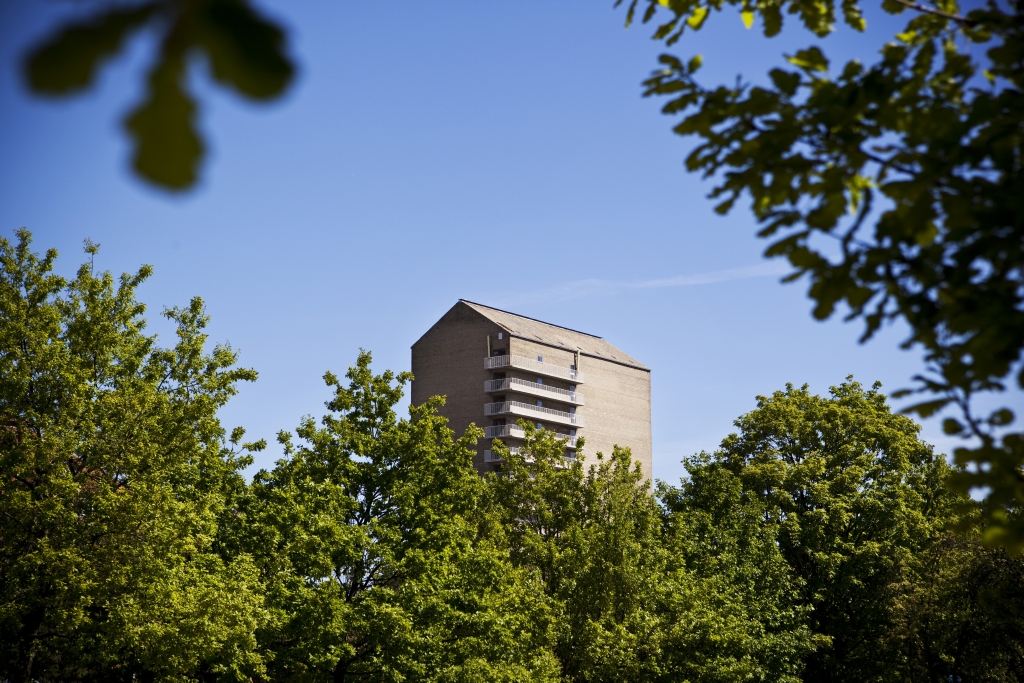
Brightspace: AU’s Educational IT platform. This is where you’ll find materials for your classes, information about your course and messages from your lecturers. An important platform that’s always super easy to navigate (not).
BSS: See Aarhus BSS
C
C.F. Møller: The architect behind Aarhus University’s main campus in Aarhus – who also designed several buildings on AU’s new campus right across the street from the University Park, the University City.
Campus: In Latin, ‘campus’ means ‘open space’. In English, it refers to a university’s grounds and buildings. Aarhus University can boast of three campuses: Aarhus, Herning and Emdrup. And a new Viborg campus is in the works.
Cand.: Abbreviation for the Latin word ‘candidatus’. In Danish, Master’s degrees are called ‘candidatus degrees’, and when you graduate, you get to call yourself ‘cand. + the subject you studied’. Two common ‘cand.’ titles you might encounter are ‘cand.merc.’ (MSc in economics), ‘cand.mag.’ (Master of Arts).
Christmas holiday: Not something you can take for granted as a university student, unfortunately. The exam period for the autumn semester spans December and January, so you may not find your Christmas break very relaxing. On the contrary.
Conservative Students: Student political association on the conservative side of the Danish political spectrum. Conservative Students candidates stand in the university’s elections every year, when representatives to the various AU committees and boards are elected. They also organize lectures and ‘port and policy’ evenings.
Credit transfer: When you transfer from one university degree programme to another, you can apply to have credits transferred. In other words, courses or exams you took previously can count towards your new degree.
D
Dean: The leader of a faculty. AU has five deans, because there are five faculties.
Delfinen: Definen (‘the dolphin’) is the student magazine at AU and is published by the Student Council. It’s written by students for students. The name of the magazine is a reference to the university’s seal; here it symbolizes speed and excellence. The university also has a motto. In Latin, of course: Solidum petit in profundis. Which means: ‘We seek solid ground in the depths.’
Den Sidste: Café Paradis is a night club that’s affectionately known as Den Sidste (‘the last one’) because you can party until the sun comes up there. It’s located in the movie theatre Øst for Paradis. Though not technically part of AU, you won’t meet many students who haven’t been there. Super hyggelig place with soul and reasonable prices.
Denmark’s biggest Friday bar and sports day: Takes place every year on the second Friday in September, when the university celebrates the anniversary of its founding, on the same day as the annual celebration. While staff celebrate the day with a ceremony in the Main Hall and an evening concert at Concert Hall Aarhus, students take a somewhat less sedate approach to the festivities: first sports, then draft beer, music and lots, and lots, and lots of people in the University Park. Some people skip the sports and go directly to the beer.
Department/school: Each faculty is divided into subunits called ‘institutter’ in Danish. At all of AU’s faculties except Arts, these institutter are called ‘departments’. At Arts, they’re called ‘schools’. To simplify things even further, at Arts, the ‘schools’ are divided into ‘departments’ (afdelinger). Makes perfect sense, right?
Distinguished alum: On the occasion of AU’s 80th anniversary in 2008, the university established a distinguished alum award. Each year, the award honours a graduate of Aarhus University whose impressive achievements have drawn positive attention to the university. So, yet another fancy title you can aspire to. King Frederik is a distinguished alum, along with former Prime Minister Anders Fogh Rasmussen and a host of other luminaries.
DOKK1: The largest public library in Aarhus. You can study here, and the view of the harbor is fantastic. It’s quite centrally located downtown, so if you don’t feel like biking up the hill to AU, it’s a great place to work.
E
ECTS: ETCS, ESCT, ETSC or just E-C-T-S. Can you count to 180 ECTS? ECTS stands for the European Credit Transfer and and Accumulation System. It’s a standard system for comparing academic credits (which measure the workload for a particular course) for higher education throughout the EU. A semester’s worth of academic work is equal to 30 ECTS. This means your lecturers decide how much you need to study (and learn) in a single semester based on this number. A decision-making process that’s always completely rational and reasonable, of course...
Eduroam: AU’s Wi-Fi network. Good luck!
Emdrup: One of AU’s campuses, located just outside Copenhagen. In other words, a tiny AU oasis in the middle of a University of Copenhagen desert.
Emerita/emeritus A retired professor who still has an office at the university. In other words, a person who can’t let AU go. Who can blame them?
F
Faculty: There are five faculties at AU. Faculty of Arts, Faculty of Health, Aarhus BSS (School of Business and Social Sciences), Faculty of Natural Sciences and Faculty of Technical Sciences. A faculty is an umbrella for a variety of related disciplines, such as the humanities or medicine, and is composed of departments (or schools, see Departments/Schools) specialising in the various disciplines. For example, Health is the umbrella for health sciences, and is composed of departments like the Department of Clinical Medicine and the Department of Public Health.
Not pass: The polite term for ‘fail’. A failed exam will be registered as ‘not passed’.
Free Forum Aarhus: Student political organisation with a social democratic set of values. Free Forum Aarhus candidates stand in the university’s elections every year, when representatives to the various AU committees and boards are elected. Also hosts a variety of lectures every semester.
Freedom of speech: You have freedom of speech in Denmark. It’s enshrined in the Danish constitution (Grundloven). In the spring of 2022, AU issued a declaration on freedom of expression for staff and students. The declaration confirms that “at Aarhus University, there must be scope for a diversity of viewpoints and opinions. In academic debate, in research and in teaching, it must be possible to explore and discuss ideas and thoughts freely. This also applies to ideas and thoughts that some may find unpleasant, wrong or even offensive. It is up to the individual to challenge ideas or thoughts with which they disagree.”
Friday Bar: You need to start early (and have high alcohol tolerance) if you’re planning on hitting every AU student bar on your Friday-bar crawl. There are almost 40 different Friday bars at AU. They’re for students and by students, so they’re cheap, informal and high-energy. In other words, there’s no excuse to sit at home and watch paint dry on a Friday night, even if your bank balance is getting perilously close to zero.
Omnibus' reviews of the AU Friday bars and our map of the Friday bars
G
The Golden Bedpan: Perhaps the holiest artefact at AU: the trophy for winning the annual Regatta. The Golden Bedpan is currently in the possession of the engineering student association, FUT; they were victorious in the 2022 Regatta.
Greenland: AU has an Artic research station called Zackenberg in northeast Greenland. Its closest neighbor is the Sirius Dog Sled Patrol.
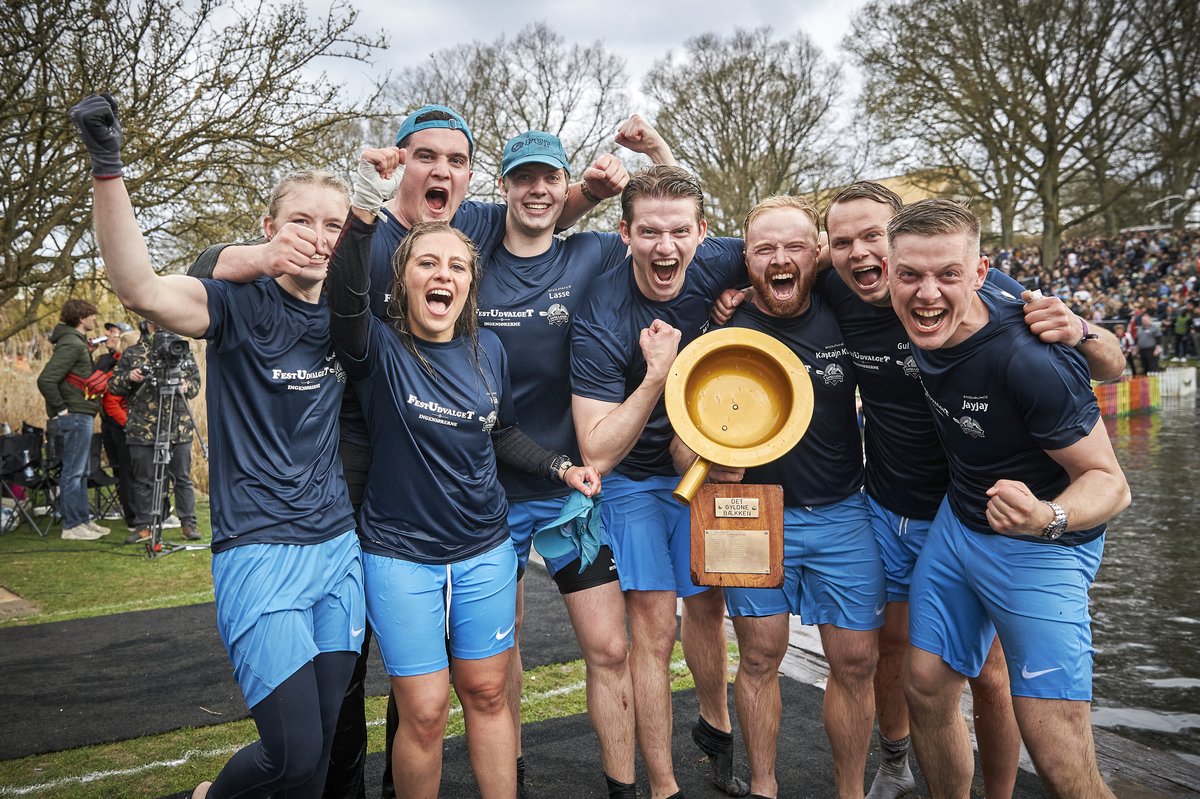
H
Health: One of the five faculties at AU. Health is home to the Department of Biomedicine, the Department of Public Health, the Department of Clinical Medicine, the Department of Dentistry and Oral Health and the Department of Forensic Medicine. In other words, everyone who had a high grade average and advanced placement math in high school. And who doesn’t mind wearing scrubs.
Help: Do you need help? Here’s a collection of useful links for your hour of need: The Students Hotline, The Student's Council's legal aid (link in Danish), grief groups (link in Danish), students counsellors, the university chaplains, special educational support, the student grants and loans office. You can also find out who to contact if you experience harassment, bullying, discrimination or physical violence.
Herning: A city on the moors of western Jutland – and an AU campus. AU Herning offers degree programmes in engineering and business administration.
Higher doctoral degree: In the Danish system, an even higher academic degree than the PhD. So if you feel like earning yet another qualification after you’ve taken your Bachelor’s, Master’s and PhD degrees, and after having written countless research articles and having taught legions of students, then you can write and defend a higher doctoral dissertation. In other words: The paper you write after spending your ENTIRE life at AU.
Honorary doctorate: In connection with the annual celebration each year, Aarhus University confers five honorary doctorates on researchers from other institutions with whom the university enjoys particularly close and valued working relationships. Aarhus University's first honorary doctorate was conferred in 1946.
I
Internship: Internship, work placement, field practicum, project placement. Six of one, half dozen of the other.
IT City: Satellite campus in the Katrinebjerg neighborhood north of the University Park in Aarhus. Home to a variety of media and technology-related degree programs and a lot of engineering programs.
K
Kasernen: Part of the main campus in Aarhus on Langelandsgade; former army barracks (‘kasernen’ means ‘the barracks’). A variety of humanities degree programmes are located here, such as musicology, art history and comparative literature.
L
Lakeside Lecture Theatres: Lecture theatres at the southern end of the University Park campus (Søauditorierne). Look up. There’s an amazing painting on the ceiling by the Danish artist Per Kirkeby.
Langelandsgade: Not merely a street in Aarhus; our answer to Mont Ventoux, scaled by hundreds of students every day, by bike or on foot.
Law Hill (Jurabakken) A hill in the University Park that’s (unofficially) the property of the law students. Especially during the Regatta.
LEA, UFFE, EDDI and all the others: The university is awash in acronyms. And you need more than one university degree to figure out what they stand for. LEA refers to ‘the administration's management team’. UFFE refers to ‘the Committee for Research and External Cooperation’. As well as a slightly old-fashioned man’s name. EDDI is the system ‘Educational Designer’. Also a man’s name. You can always try asking a staff member to decipher an AU acronym for you. But they’re probably just as confused as you are.
M
The Main Hall (Aulaen) The high-ceilinged, elegant events hall at the northern end of the University Park. This is where the annual celebration and the study fair are held.
MatKant: Short for ‘Matematisk Kantine’. An AU canteen with a reputation for quality – big slices of cake and big cups of coffee at low prices.
mystudies.au.dk Your gateway to all the information you need about your studies and relevant self-service systems. Start there...
N
NAT: Or rather the Faculty of Natural Sciences. One of the five faculties at AU. Here you will find the Department of Computer Science, the Department of Physics and Astronomy, the Department of Geoscience, the Interdisciplinary Nanoscience Centre (iNANO), the Department of Chemistry, the Department of Mathematics and the Department of Molecular Biology and Genetics. In other words, brainy people doing their thing in the lab, by the blackboard, or behind the computer.
Navitas: A building on the waterfront between Aarhus Docklands and DOKK1, which is still home to some of AU’s Master of Science in Engineering programmes (civil and architectural engineering and mechanical engineering) and the Bachelor of Engineering programmes in civil and architectural engineering, architectural engineering, and mechanical engineering. However, before long, all of AU’s engineering programmes will be brought together at Katrinebjerg.
Newsletter: Would you like to receive your university paper’s newsletter? Sign up here
Nobel Park: Another area of campus in Aarhus, which is located between Randersvej and Nordre Ringgade. This is the home of many Arts degree programmes, including languages, history, global studies, philosophy and education science.
O
Office package: A must-have tool for students – and you get free access to the Microsoft Office package as a student at AU.
Omnibus: Omnibus is the official university newspaper for students and employees at Aarhus University. It is published online at omnibus.au.dk. Omnibus aims to be a medium that forges identity, brings people together and sparks debate. The newspaper has editorial freedom – which means that we are independent of the management and other university stakeholders. You can follow Omnibus on Instagram, Facebook and Twitter.
Orientation week party: A party held in Mølleparken on 1 September every year to welcome new and current students to Aarhus with a variety of music, events and entertainment throughout the day.
P
Post.au.dk: A fomer mail service that is linked to your student ID. Now all students have access to Outlook. Information about your classes or about your studies in general will often be sent to your email account. It’s a good idea to check it once in a while...
Postdoc: A postdoc is a temporary research position that requires a PhD degree.
Prescribed study period: The standard length of time it takes to complete a given degree programme. In other words, the time you can expect to spend becoming a real adult if you earn 30 ECTS every semester – and if you don’t have to delay your degree because of serious illness, failed exams or periods of leave. In these cases, it’s good to know the term ‘maximum degree completion time’... see above.
Professional Bachelor’s degree: A professional Bachelor's is a medium-cycle higher education programme. It consists of 210 ECTS, which corresponds to 3.5 years.
Professor: The highest position for academic staff at the university. A professor is a tenured member of teaching and research staff. In four out of five cases, a professor will also be a man.
Project placement: Also see ‘internship’. On many programmes at AU, it’s possible to complete a project placement in the workplace as part of your degree. Check out the options in your academic regulations.
Pro-rector: The rector’s deputy. Or McGonagall, if AU were Hogwarts. She’s called Berit Eika and has been the pro-rector since 2014. The pro-rector is primarily responsible for education. Berit Eika is a qualified medical doctor and professor of medical education.
Pulse: The mobile app version of Brightspace – so you always know if your teacher has uploaded yet another text for class tomorrow.
R
Reading room: A room in which you can sit and read in peace and quiet. Make sure you don’t make too much noise with your highlighter pen!
Rector: The rector is the university’s Dumbledore. AU’s current rector is Brian Bech Nielsen. He has been the rector since 2013 and is educated as a physicist. You don’t see him very often. But, every year, he starts the AU Regatta, along with the mayor of Aarhus. The rector is part of the Rector’s Office, which is a nice word for the management corridor. It’s located at Nordre Ringgade 1.
Regatta: AU’s famous and notorious event. The Regatta is held in the University Park every spring semester, and it is here that the battle for the Golden Bedpan takes place. And no, it’s not a posh affair like in Oxford or Cambridge. It’s the Jutlandic version... Need we say more? Go see for yourself!
Royal Library: The Royal Danish Library (though some still like to call it Statsbiblioteket, the State and University Library). Home to the famous book tower – the tall building at the top of the University Park. Here you will find reading rooms, study places, a library with countless books, and an excellent cafeteria with a terrace.
Rus: A Danish term used to refer to first-year students at the university. It originates from the Latin word Depositurus, which denotes a person who undergoes a ritual of admission. The plural is ‘russer’. Not to be confused with ‘en russer’ (one Russian), ‘to russere’ (two Russians). That’s something completely different.
Rus week: Your first week at AU (sometimes referred to as student orientation week). The week before your actual teaching starts. A week often characterised by socialising, fun costumes, weird challenges and – for some – far too much alcohol.
S
Semester: At AU, your degree programme is divided into half-year periods. A semester is approximately six months and ends with an exam period. People often talk of spring and autumn semesters. And winter and summer exams.
Senior management team: The senior management team consists of the rector, pro-rector, university director, the five deans, and the director of enterprise and innovation. The team is responsible for the day-to-day management of AU within the framework set by the AU Board. It’s also known by the snappy abbreviation UniLed.
Sports day: Most people know this better as Denmark’s Biggest Friday Bar. But, for some, it starts as a traditional sports day.
SPS: Abbreviation of the Danish term for Special Educational Support. SPS offers support to students with functional impairments or disabilities.
STADS: The oldest online system at AU. Here you can see your grades, your classes and much more. STADS is a rusty car that is destined for the scrap heap in 2027. And it’s held together by gaffer tape.
Stakbogladen bookshop: You can buy all your textbooks here. If money isn’t a problem and you’d like to buy all your books new, this is a good place.
Student adviser: More experienced students who mentor new students – and make it clear that student life is actually good fun.
Student associations: There is a myriad of student organisations at AU. Some are more academic than others. But you will undoubtedly be able to find one that suits you.
Student Bar: The Student Bar is a bar on campus. Known for its huge selection of speciality beers and its 13 draught beer taps. The bar is run by students and belongs to the Student House.
Student Council: The Student Council at Aarhus University is spread across the university by virtue of its many degree programme councils. Along with representatives from Konservative Studenter (Conservative students) and Frit Forum (Free Forum), the Student Council fights the students’ corner internally at the university – and functions as the students’ voice in the media. The Student Council has existed since 1932 and organises the Student Fair, Denmark’s Biggest Sports Day and Friday Bar, and the Orientation Week Handbook. They also run the Legal Aid Service (Retshjælpen) and the student telephone helpline (Studenterlinjen).
Student Counselling Service: The Student Counselling Service offers free social and psychological support for students in higher education. To get help from them, you just need to be actively enrolled on an SU-approved higher education programme. The Student Counselling Service can assist with everything from psychological challenges to practical questions about SU, parental leave or illness.
Student guidance: You probably know them from secondary and upper-secondary school. But student guidance is also available at AU. A student guidance interview can be about anything that affects your life as a student and is based on your individual needs. You can discuss topics ranging from academic regulations to subject choices and wellbeing.
Student Halls of Residence in the University Park: Student accommodation in the University Park – with its distinctive yellow brick and white balconies. The rooms are small, but the location is top. Even Queen Margrethe II lived here when she studied at AU.
Student Halls of Residence in the University Park. Photo: Jesper Rais
Student House: The Student House Aarhus is an association where students can meet each other across degree programme and nationalities in both a social and academic context. Its aim is to foster a sense of community among students and to support the students’ ability to act and take initiative.
Student radio: If you are a fan of old-school radio, you can listen to Aarhus Student Radio. This student radio station was launched in 1996 and is run by students who are passionate about making radio for the student community. It is broadcast on both FM and digital radio and also releases podcasts.
Student registration number: No, this is not the same as your AU ID. Your student registration number is your ID at AU, and you will need this number for your exams, among other things. In Danish, this number can be referred to as a studienummer, årskortnummer or studiekortnummer. They all mean the same thing.
Student-led guidance: Not student guidance, but student-led guidance. Here it is the students who are ready to help with your questions and concerns.
SU: A short form for the Education Grant and Loan Scheme in Denmark. A lifeline, a gift, too much, too little – everyone has an opinion on SU. But one thing is for sure – it won’t land in your bank account by itself. Remember to apply for it!
Supplementary subject: Many of the university’s degree programmes allow you to combine two subjects – a main subject and a supplementary subject. A main subject is that which you are admitted to when you apply for a Bachelor’s degree. A supplementary subject, which must always be started at Bachelor level, is an independent module that enables you to specialise in a particular area and create your own profile. It usually equates to 45 ECTS.
Syllabus: The selected texts and material you need to read in connection with your teaching. Your teacher will usually provide you with the syllabus at the beginning of the semester.
T
TAP: Abbreviation of the Danish term for technical and administrative staff, which is often used in its Danish short form in English texts. Members of TAP staff keep the wheels of the large AU machine turning, and they include everything from study-administrative employees to graphic designers, laboratory technicians, animal technicians (yep, AU has laboratory animals that need to be looked after), cleaning staff, caretakers, gardeners and secretaries. In other words: Keep on good terms with the TAP staff!
TECH: Abbreviation of the Faculty of Technical Sciences. One of the five faculties at AU. Here you will find the Department of Agroecology, the Department of Biological and Chemical Engineering, the Department of Civil and Architectural Engineering, the Department of Ecoscience, the Department of Electrical and Computer Engineering, the Department of Food Science, the Department of Animal and Veterinary Sciences, the Department of Quantitative Genetics and Genomics, the Department of Mechanical and Production Engineering, and the Department of Environmental Science. In other words, TECH is a mixed bag – there are those with a mastery of technology who want to fix things that others take for granted. There are those with their gaze directed at the soil, the environment and the plants. And those who research animals. And food. And those who know whether the building works – on more than an aesthetic level.
The Kitchen: Do you want to start your own business whilst you’re a student? The Kitchen is for those who have a business idea they want to test or a company they want to grow whilst they are studying. In The Kitchen, you’ll get access to start-up consultants, lawyers, accountants, events, meeting rooms and a network of 300 other students on the same entrepreneurial journey as you. Why is it called The Kitchen, I hear you ask? Because it is located in the old central kitchen of the former municipal hospital in the University City (see below).
U
Uni Park: The green area within the yellow walls.
Uni: An abbreviation for university (no surprises there...), which is used again and again – and you’ll no doubt start using it yourself, because it takes too long to say ‘university’ every time.
UniLed: An abbreviation of the Danish term universitetsledelsen – the senior management team (see above).
University Board: The university’s highest authority, which sets the overall strategic framework for AU. Students have two representatives on the board. And employees have three (one elected from among technical and administrative staff and two elected from among academic staff). The internal members of the board are elected by students and staff in university elections, while the external members are appointed. Currently Birgitte Nauntofte, professor and former president of the Novo Nordisk Foundation is chair of the AU Board.
University chaplains: Need to talk to someone? Being a student can be difficult, and it’s not just your studies that can play on your mind. Perhaps you’d like to talk things through? The university chaplains are there to listen and their services are completely free. You can speak to them in confidence, regardless of your religious background or beliefs.
University City: AU’s new campus, which is beginning to take shape on the grounds of the former municipal hospital. A city in a city, which will be home to a range of AU’s degree programmes and research activities. So far, the Department of Molecular Biology and Genetics, AU IT, and the entrepreneurial hub The Kitchen have all moved onto the site.
University elections: Every year, students at the university take to the digital ballot box when there are university elections at AU. Three student associations usually put themselves forward and fight for your vote – and to represent you in AU’s boards of studies and academic councils as well as on the university board. Employees also vote – but not every year.
University newspaper: Omnibus is your independent university newspaper. It is the official newspaper for staff and students at Aarhus University.
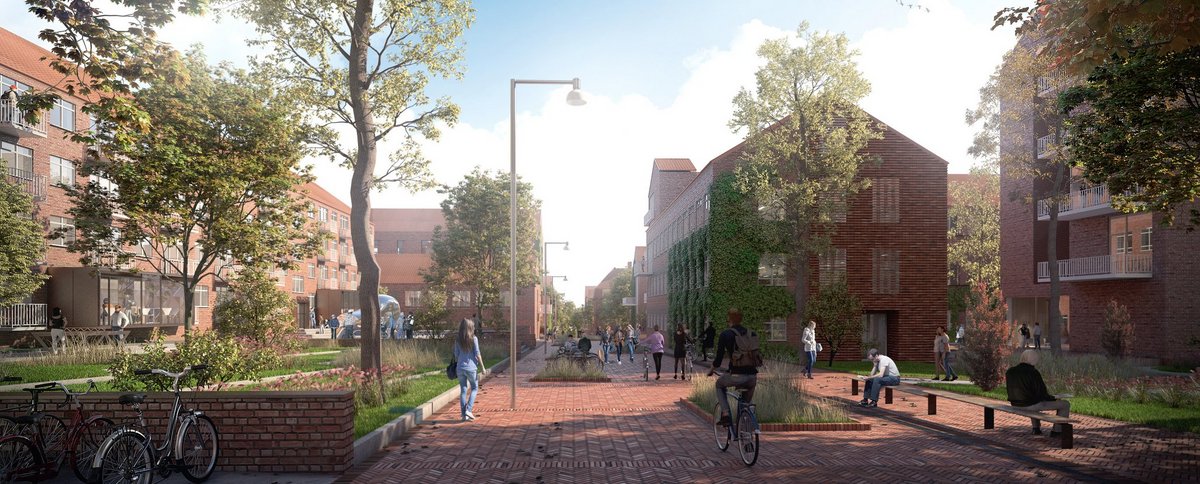
V
Viborg: Where one of AU’s new campuses will be located – OK, not in downtown Viborg itself, but in Foulum, just outside the city. Campus Viborg will be for students of veterinary medicine, animal science and agrobiology.
Vice-dean: The dean’s deputy. Faculties usually have more than one vice-dean, who work with the dean to lead the faculty.
VIP: A Very Important Person. Well, yes, but not the kind you see on the red carpet! At AU, VIP is an abbreviation of the Danish term for academic staff. In other words, your teacher, regardless of whether she is a postdoc or a professor.
W
Weekend trip: As part of the intro programme in the first semester, almost all degree programmes at AU include a weekend trip, where student advisors arrange social activities and fun challenges. A trip often associated with huge hangovers.
Whistleblower scheme: Aarhus University has a whistleblower scheme, which is intended to make it easier to report suspicions of unlawful activities, serious incidents of bullying and harassment, or other serious offences without the risk of reprisals. The scheme does not include students, unless they have a student job or perform voluntary work at the university.
WISEflow: WISEflow is Aarhus University's platform for conducting digital exams. Here, you will find your exam assignments and upload your submission before the deadline expires. WISEflow counts down for you — whether it's a six-hour exam or your Master's thesis — allowing you to see exactly how many (or how few) days remain until submission. In other words, WISEflow is unavoidable.
Z
Zackenberg: AU has an Artic research station called Zackenberg in northeast Greenland. Its closest neighbour is the Sirius Dog Sled Patrol. And, of course, the local polar bears.


